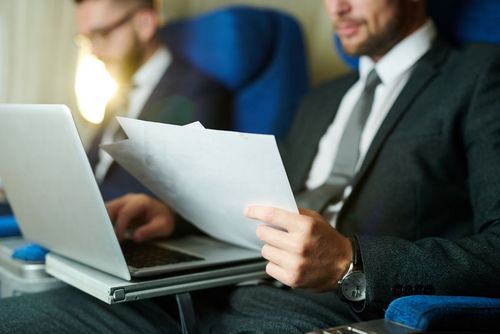The COVID-19 pandemic caused German companies and public institutions to spend on business travel falling to an all-time low in 2020. Like the current one VDR business travel analysis documented, the expenditures were reduced by 81.7 percent compared to 2019 and reached 10.1 billion euros, the lowest level since data collection began 19 years ago.
In total, there were 32.7 million business trips (- 83.3 percent) and 3.3 million business travelers (- 74.9 percent) last year. The VDR business travel analysis presented today in Frankfurt am Main reflects the travel behavior of German companies and public sector organizations in 2020.
“The results show painfully the force with which the COVID-19 pandemic hit companies and providers in the business travel industry. The analysis also proves once again the importance of business travel for Germany as a business location. In the years before the pandemic, companies and their business travelers made a steadily increasing contribution to regional added value in addition to spending on transport and accommodation – for example in gastronomy, retail, the service sector and culture. These sales in directly and indirectly profiting industries almost completely collapsed in the Corona year, “said VDR Vice President Inge Pirner.
Significantly fewer business trips and travelers
In 2020, the number of business trips plummeted from the record level of 2019 (195.4 million) to 32.7 million – equivalent to a decrease of 83.3% compared to the previous year. Around four fifths of the sales that business travelers usually generate in the hospitality and transport sectors were lost in 2020. German service providers were particularly affected, as the majority of business trips have always taken place in Germany; in 2020 it was 83% (27.3 million). Almost every third company from medium-sized companies (28.6%) and 24.2% of organizations in the public sector completely avoided business trips.
–
Trend towards longer trips in SMEs
While the small and medium-sized enterprises (SMEs) tended to be shorter and shorter until 2019 – day trips made up 70% in this size class – the few trips in 2020 tended to take longer. The average duration increased accordingly – according to the motto “if already on the way, then longer”. The combination of urgently needed business trips should also be found in it. The opposite picture emerged in larger companies, which usually would have had to do more often overseas.
Burglary even with overnight stays
In the business accommodation sector, the importance of medium-sized companies became apparent again in 2020. While in the previous year around half as many bookings came from the largest companies as from medium-sized companies, the overnight stays by SMEs in the first pandemic year of 2020 accounted for around three quarters of the total overnight stays. The figures from the public sector (-78.3%) and from companies with more than 500 employees (-81.6%) collapsed above average.
Boost for digitization and new working environments
Two areas are emerging in mobility management that will certainly help to cope with the next pandemic even better: 96% of companies see the digital process optimization – which was also important before the pandemic – strengthened. 94% agree with the statement that hygiene concepts will continue to be important when traveling. Digitization is creating new working environments: 84% of those responsible for business travel will include work from anywhere, increasingly also from the home office, in their planning. 48% of them will also need more advice from service providers.
Sustainability is increasingly becoming a competitive factor
Over 90% of travel managers in companies and 97% in the public sector state that sustainability will develop into a competitive factor to a large extent or in some cases when choosing service providers. The biggest change of heart took place in medium-sized companies within a year: In 2020, 55% of them answered this question in the negative, today it is only 9%. Significantly more companies in Germany than a year ago are actively promoting sustainability in the business travel sector. This change is particularly noticeable among smaller companies. In the middle class, 73% of the companies plan or implement measures for a better CO2 balance, in the larger companies it is 85%.
Video conferences are part of everyday life – more rail travel within Germany
Not only because of the corona, but also from a sustainability perspective, telephone / web or video conferences have become part of everyday life in almost all companies. The number of business trips is currently or will be reduced in 87% of all companies. On domestic German routes, 73% of the companies surveyed have switched from airplanes to trains and 13% are planning to do so in the future. The least frequent use of incentives or bonus points for the benefit of sustainability projects; the simpler way of CO2 compensation is chosen much more often – currently 47% of those surveyed and 30% plan to do so.
30 percent fewer business trips in the future
The added value of a business trip will be examined even more closely in the future, whereby the balance between company interests and expectations of customers and employees will remain in focus. 80% of the larger, 72% of the smaller companies and 81% of the interviewees from the public sector expect a permanent reduction in business travel. How big this reduction will be remains to be seen, but if your predictions are correct it will average 30%.
“In the future, it will not be possible to completely replace face-to-face meetings with video conferences. Rather, it will be a matter of finding alternatives that are sensitive to the situation. For necessary trips, there will be a greater planning effort, especially in the transition phase to the ‘post-pandemic period’. Employers will deal even more intensively with the question of how they can best support their travelers, ”concluded Pirner.
The current edition of the Business Travel Analysis can be found at www.geschaeftsreiseanalyse.de can be obtained.
–


